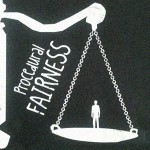 I’ve written a few times about the important role fairness plays in a social organization.
I’ve written a few times about the important role fairness plays in a social organization.
A recent study suggested, for instance, that the fairness of the organization is especially important when we expect employees to collaborate closely with one another. It revealed that when employees believe there is a strong sense of ‘procedural justice’ in their organization, their collaborative efforts are greatly enhanced.
Most of us, I suspect, want to work in an environment that’s fair and equitable. The modern workplace can be a cut-throat environment however where competition is extremely fierce. Does such an environment prevent fairness from emerging? Are we less just when we ramp up our competitive urges?
The fundamental role fairness plays in the human psyche is underlined by the video above. It’s taken from a TED talk given by Frans de Waal and features an experiment whereby two monkeys are given rewards for completing a simple task in return for a slice of cucumber. Both monkeys were quite happy to do this, until the ante was upped, and one of the monkeys began to be rewarded with a grape.
It didn’t take long for the monkey to feel cheated by his tasteless slice of cucumber and subsequently refuse to play ball. It’s easy to imagine a similar scenario playing out in the workplace, where you may have felt cheated out of a promotion or a pay-rise. Whilst you may not have thrown things at your boss, I suspect your motivation levels dropped in a similar way.
The role of competition in fairness
All of this underlines the importance we place in judging fairness in a comparative way. How does that sense of fair play change when we are competing against other people? A recent study set out to explore this issue via the hugely competitive world of the National Basketball Association.
The researchers looked at over 100 basketball games, with a particular focus on fouls that resulted in a free throw being awarded. They were particularly keen to isolate instances where the foul was awarded despite no foul actually having been committed.
Free throws are normally something of a gimmee for these highly trained athletes, with success rates usually very high. How did the players respond when they’d been awarded a free throw that they didn’t really deserve?
You would imagine that in such an ultra-competitive environment, players would be keen to take advantage of their good fortune, regardless of how unfairly it had been gained. Their livelihood is, after all, largely dependent upon them winning games. Alas, the results of the study suggest that isn’t really what happens.
They found that the success rate of unfairly gained free throws were significantly lower than the normal success rate by each player. Interestingly, the success rate was at its lowest when their team was ahead in the match, so they didn’t need to score so much. However, the scoring rate was also lower when their team was chasing the game too, suggesting that there is a kind of inbuilt fairness monitor within players.
It’s intriguing, because if even some of the most competitive performers on the planet can seemingly temper their performance as a result of fairness induced guilt, it suggests it’s something that might affect each of us.
The players clearly felt very uncomfortable with their unfairly gained advantage, to the extent that it undermined the advantage that they had gained. So maybe even the most competitive industries are not beyond help.
I'd say that it mainly comes down to the morality of the person. I've known plenty down the years that would happily sell their granny for a leg up the food chain.
It's a bit like the Stanford prison experiment I'd say. Put good people in a bad environment and they'll behave unfairly. Put them in a good one and they'll be fine.